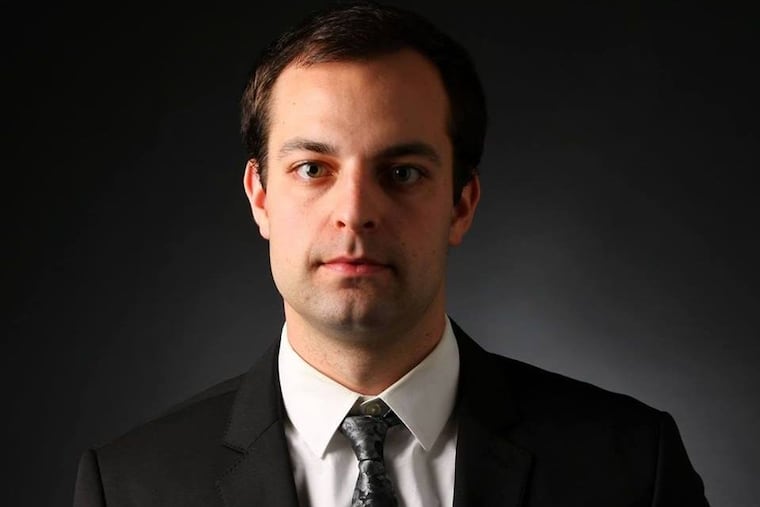For reporter and Bucks grad in Vegas, a long and sorrowful night
A New Hope-Solebury High School graduate reported on the massacre for a Las Vegas newspaper for 16 hours straight.

Wade Millward had just returned to Las Vegas late Sunday night, home after a trip to a work convention. He unpacked and lay down in bed. Then he got the text message:
"Report of two active shooters at Mandalay Bay. Who's available to help?"
Millward, a graduate of New Hope-Solebury High School who grew up in Bucks County, moved to Las Vegas in December. He's a business reporter for the Las Vegas Review-Journal and lives close to the Strip. So he texted his editor back: "I'm awake if I can do anything."
The roads were blocked off by the time Millward got near the area where Stephen Paddock had opened fire on a country-music festival less than two hours earlier. The reports weren't confirmed (it turned out there was only one active shooter); Millward did not yet know there had been a mass shooting. But when he stopped in a parking lot and people began streaming in from the direction of the festival, wearing purple general-admission bands and cowboy boots, looking dirty and talking about stepping over bodies amid "an endless spray of gunfire," he started to figure it out.
"Just talking to the people made me realize it's not going to be good," Millward, 25, said by phone Tuesday. "People kept talking about stepping over bodies, dragging their friends out, thinking it was fireworks and then realizing it wasn't when Jason [Aldean] left the stage."
Millward wasn't sure where the shooter was or even exactly where the concert had been. He just kept interviewing.
"I guess you just go into work mode, where I'm like, 'OK, I need to talk to as many people as possible and get all this stuff and send it in.' "
He worked from 11:30 p.m. Sunday to 5 p.m. Monday.
At the hospital where he went next, he saw people who had lost their clothing and shoes, a large group of people smoking cigarettes outside the hospital. The crowd waiting for friends and family spilled out the doors. Nobody knew yet that this had been the deadliest shooting in modern U.S. history. They just wanted to know whether their loved ones would be OK.
One girl was waiting for information about her friend who had been shot in the back. She changed her blood-soaked shirt for a hospital frock.
"That was a pretty tough thing to see," Millward said. "[Then] I step outside and see some discarded bloody clothing. … There was this bloody plaid shirt next to this parking garage. It's a lot of thoughts all at once. It's like, 'Wow, this is not going to be good.' And also wondering, 'OK, where should I go next, where does my editor want me?' "
He was told he could go home, but he lives next door to police headquarters, and as he arrived, a news conference was starting. Police gave Paddock's name and address. Millward called his editor and volunteered to go to the man's home in Mesquite, about an hour away.
First, he went to his apartment to check on his cat. He gathered some things to throw in the car. A videographer colleague drove and Millward slept.
In Mesquite, Millward and his colleague tried to find people who had known Paddock. They scrambled up a mountain through cacti and dirt to get a better shot of his home. They went to the local Taco Bell after hearing Paddock's brother had told the media that the man liked the restaurant. They tried the local gun store twice.
He kept wondering what made Paddock do it. He was thinking about Orlando and the 2016 Pulse nightclub shooting, which he had followed closely, having spent his early childhood in South Florida. He was expecting the death toll to rise.
"All these people's lives are changed forever because this one guy took this action. And then you think about, all these people have so many friends and family. It's just such an affecting thing."
Millward finally got some sleep Monday night, after drinks with coworkers. On Tuesday, he exchanged texts with people he interviewed, many of whom were waiting for family members to come out of surgery but "being very positive," he said. Vegas feels like a small town to its permanent residents, he said, and seeing community members try to help has been encouraging.
As a business reporter, Millward wonders how this will affect the city — and its lifeblood of tourism — in the long term, how deep the wounds will be.
"It's a heavy thought. It makes you think: 'What kind of world is this? How could someone do this?' " he said. "But then, you know, journalists have that sense of duty. Today I'm like, I'm ready to go."